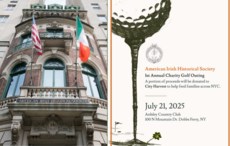"Beijing for Beginners" By Gary Finnegan Dufour Editions
Gary Finnegan, 29, is already a well-known face in broadcast journalism in Ireland, appearing regularly on radio and television, where his international perspective (particularly on China) makes him a go-to guy.
Next month sees the U.S. publication of his hilarious and always insightful debut book "Beijing for Beginners" about his misadventures in China, his briefly adopted homeland, the place he calls "the center of the universe."
China is a long way to go to get away from it all, which is part of its appeal to the writer.
As a not-so-innocent abroad, taking in the teeming streets of the Chinese capital with a wry smile and - very often - open jawed wonder, Finnegan is in his element.
Unable to speak even a word of Mandarin, he hasn't a clue how to ask for help, or accept it when it's kindly offered.
To make things even more interesting Mandarin is a tonal language, so one word can have four possible unrelated meanings, depending on the tone you use. On top of that, writes the author, meaning can vary widely depending on the context, giving one word over a dozen possible interpretations.
Just looking for an Internet cafZ to send an e-mail home turns into a memorable adventure. "Yin te wang," is the Chinese word for Internet, so Finnegan repeats the words over and over to an elderly local man, who smiles back at him uncomprehendingly.
It turns out that "yin" can also mean "gum," "te" can mean "unusual" and "wang" can mean "elf." Finnegan hopes that the old man doesn't think he's being called a weird gummy elf.
Visits to nearby neighborhoods mean taking his life in his hands.
Speeding mopeds make crossing the road a daily hazard. The smog that often hangs over the entire city chokes him, the streets are crowded and sometimes filthy . . . and yet he grows to love it.
China's financial ascent is unstoppable, so Finnegan's good timing is obvious. Cranes fill the Beijing skyline, building massive new shopping centers and even an Olympic village.
Love it or hate it, Finnegan writes, Beijing is going to be one of the world's economic hubs for decades to come. Besides, he tells himself grimly at one point, if his journalism job is outsourced there someday soon it might pay to know a little about the place.
Many aspects of life in Beijing make him laugh or horrify him, often simultaneously.
Finnegan writes with incredulity about the presentations made by the Chinese staff of the Foreign Language Department where he worked for a year.
The outrageously humble, occasionally even self-loathing introductions go like this, "I'm Wendy and I teach English. If I had to describe myself I would say I am a very weak person. But maybe I am a good mother, despite my weakness of character. Thank you. Sorry."
Wendy is followed by Jade, who says simply, "Welcome to China. I am Jade. You are all handsome and beautiful and we are not. Thank you."
Where, Finnegan wonders, do you look when someone you've never met before sums herself up as "weak" or "useless"?
China is a young country with a median age of 33. It is also remarkably family orientated, with young and old co-existing together in ways that western nations have forgotten was even possible.
China has been devouring manufacturing jobs from the west for decades so successfully, Finnegan claims, because they're experts at figuring out what European and American companies do, then offering to produce the goods cheaper and faster.
The west is mistaken if it thinks that its high tech, high-end jobs will be safe from the Asian mass production lines. Innovation and creativity are now being fostered with the same yes-we-can ambition and attention to detail that made the original Chinese labor efforts so successful in the first place.
For his Chinese students, Finnegan discovers, it's lights out every night at 11 p.m. They come to class energized and alert at 8 a.m. Drinking is frowned upon, and there's no late night partying.
To his surprise he discovers that young Chinese people go to college just to study. It's perhaps the biggest moment of culture shock of his entire trip.




Comments